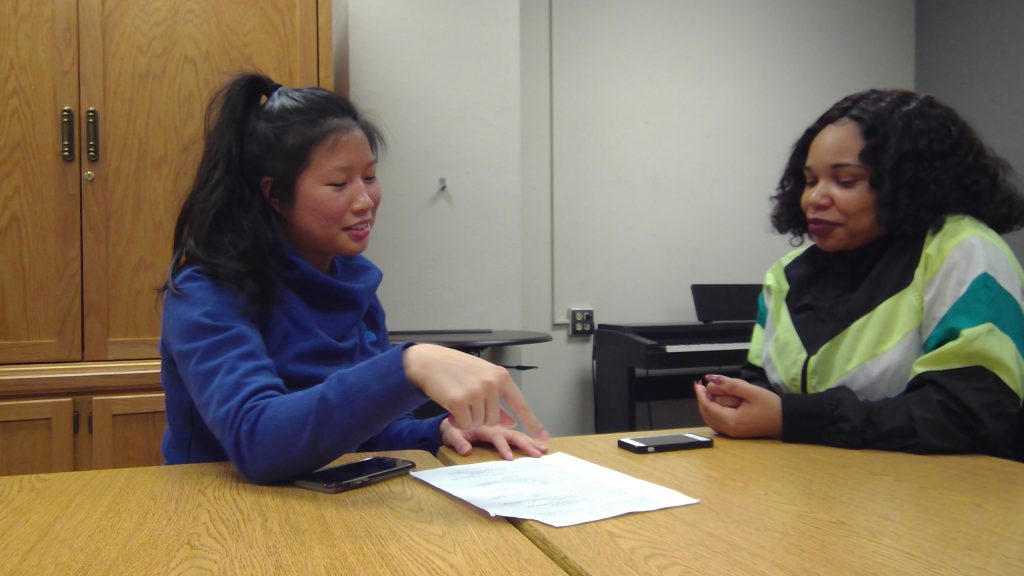If you ever ask her to decide her differences, she would say
“I have big lips, thick hair, a gap in my teeth, and a lighter complexion. Those are characteristics that people notice right from the beginning” (00:24)
Though the beauty of her light complexion comes with strong individual, motivation, and positive energy some may still judge her for their reflection.
“I attended Confluence Academy-Old North which is a predominantly black school. A male classmate taps me, and he precedes to ask, “Are you white?” No, I’m black too. I was young but he then says, “Oh okay well never mind”. I was just kind of caught off-guard.” (16:49)
She may look different to you but, to her, she is the same as the two of you.
“My friend was talking about how my phone is always going off with notifications and text messages. She claims that I have a boyfriend, which I don’t, but she says things like “Oh ya’ll light skins have more of an advantage in relationships” or “ya’ll get all the love.” (19:55)
Though she encounters those who judged her for their reflection, she had anchors who taught her to embrace herself and love herself for who she is.
“No, I would not change myself because of my parents. They would always give me motivation, positive energy, and loving support so I would never feel like I should change who Kennedi Noel Glass is.” (03:21)
“It’s not your job to be likable. It’s your job to be yourself. Someone will like you anyway.” -Chimamanda Ngozi Adichie. In a world where social media plays such a huge roll in young adults and kids lives you tend to see stereotypes within a race.
“It’s worse in society now because we have social media and there are more ‘standards’ and opinions out here. You’ll hear that light skin girls are more attractive than dark skin girls so again.” (11:43)
While listening to Kenndi during the interview, I’ve noticed that though we’re different by skin color we go through the same thing with stereotypes.
The stereotype in the black community that the girls in the community has to deal with is being light or dark skin. With the color of their skin color, they’re either getting all the love or having a bigger advantage of being in a relationship.
I, a Vietnamese American deal with the stereotype of being too skinny or too big for my body type. Growing up I’ve always got comments by others who were older than me. Telling me that to have a thinner body figure, a boy would find me more attracted and like me more. Yet the older I got I noticed my body figure didn’t even matter to the boy I fell in love with. My body figure wasn’t accepted by others who kept on commenting because as a kid, for them they would always hear those things from their older relatives; they grew up with that type of mindset thinking that to be like and to get the attention your body figure had to be thin and pale.
For both Kenndi and I, we deal with the appearances that society either accepts or isn’t ideally. With the new generation
After the end of the interview, I’d asked Kennedi what she wanted people to know…
“Everyone is beautiful, everybody is unique, we all goals and aspirations, so just let us live our best lives and be successful. We’re strong and determined.” (26:33)
Artist’s Statement

In my free verse poem, I focused on the main topic of Kennedi and I’s interview, the color of her skin. At the beginning of my poem I decided to not give away Kennedi’s name because I wanted the audience to relate to her by just knowing what she looked by the description that was given, and the struggles that she went through. Giving two examples that Kennedi encounter gives the audience an insight to what she went through, but if you pay close attention to the people that were asking Kennedi about her identity, you would notice that they are the same race as Kennedi. Even though there are some people outside of the race making a rude comment and judging people, it also happens inside that group of people as well. Stereotypes in the group itself often happen between the girls, because now-a-days, girls tends to judge each other, instead of empowering one another. The reason why I gave the audience Kennedi’s identity at the end was because of how she overcame the situation, which was because of her parents teaching her to love who she is and taking pride of Kennedi Noel Glass.
